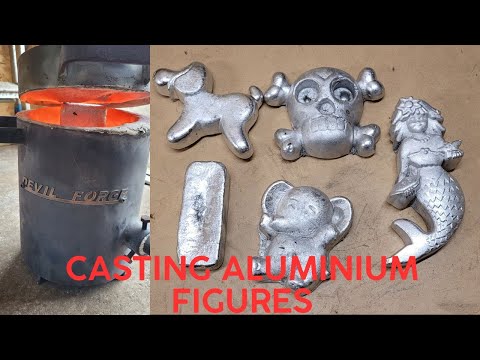The 5-Second Trick For Stahl Specialty Company
The 5-Second Trick For Stahl Specialty Company
Blog Article
Some Known Incorrect Statements About Stahl Specialty Company
Table of ContentsWhat Does Stahl Specialty Company Do?Stahl Specialty Company Can Be Fun For EveryoneThe Of Stahl Specialty CompanyUnknown Facts About Stahl Specialty CompanyWhat Does Stahl Specialty Company Mean?
The subtle difference lies in the chemical content. Chemical Comparison of Cast Aluminum Alloys Silicon promotes castability by decreasing the alloy's melting temperature and improving fluidity during casting. It plays a crucial function in permitting elaborate molds to be loaded precisely. Additionally, silicon adds to the alloy's stamina and wear resistance, making it useful in applications where sturdiness is important, such as vehicle components and engine components.It additionally improves the machinability of the alloy, making it much easier to process into ended up items. In this way, iron contributes to the total workability of aluminum alloys.
Manganese adds to the toughness of light weight aluminum alloys and boosts workability. It is commonly utilized in wrought aluminum items like sheets, extrusions, and accounts. The presence of manganese help in the alloy's formability and resistance to breaking throughout construction processes. Magnesium is a light-weight element that gives stamina and effect resistance to light weight aluminum alloys.
It enables the production of light-weight parts with excellent mechanical homes. Zinc improves the castability of aluminum alloys and assists manage the solidification procedure during casting. It improves the alloy's stamina and hardness. It is often located in applications where detailed shapes and fine information are necessary, such as ornamental castings and particular auto parts.
Rumored Buzz on Stahl Specialty Company
Due to the fact that aluminum-silicon alloys have excellent casting residential or commercial properties, high gas buildings, basic procedures, and exceptional deterioration resistance, aluminum-silicon alloys are most frequently used in the die-casting sector in the house and abroad. At the exact same time, aluminum-silicon alloys are likewise relatively early and extensively identified alloys created and made use of in die-casting. After continuous research study and renovation, many of the existing international mainstream aluminum-silicon alloys have actually been completed and are absolutely nothing even more than A356, A360, A380, ADC12, B390, and A413.
The primary thermal conductivity, tensile strength, yield toughness, and elongation vary. Among the above alloys, A356 has the greatest thermal conductivity, and A380 and ADC12 have the least expensive.

Stahl Specialty Company - Questions
In precision casting, 6063 is appropriate for applications where complex geometries and high-grade surface area coatings are extremely important. Instances consist of telecommunication rooms, where the alloy's premium formability enables streamlined and cosmetically pleasing styles while preserving architectural integrity. In the Illumination Solutions sector, precision-cast 6063 parts develop classy and reliable illumination components that need elaborate shapes and excellent thermal efficiency.
(https://stahlspecialc.edublogs.org/2024/12/14/your-trusted-foundry-near-me-unraveling-excellence-in-casting-foundry-and-aluminum-castings/)
The A360 displays premium prolongation, making it perfect for complicated and thin-walled parts. In accuracy spreading applications, A360 is appropriate for sectors such as Consumer Electronics, Telecommunication, and Power Devices.

In accuracy casting, aluminum 413 radiates in the Consumer Electronics and Power Equipment markets. This alloy's premium rust resistance makes it an outstanding choice for outdoor applications, guaranteeing long-lasting, durable products in the discussed sectors.
The Stahl Specialty Company Statements
The light weight aluminum alloy you choose will substantially impact both the spreading process and the residential properties of the last item. Due to the fact that of this, you should make your decision very carefully and take an enlightened approach.
Establishing the most ideal aluminum alloy for your application will certainly indicate considering a large array of attributes. The first classification addresses alloy characteristics that affect the manufacturing process.
The alloy you select for die casting straight affects several elements of the casting procedure, like how easy the alloy is to deal with and if it is vulnerable to casting defects. Hot cracking, additionally called solidification breaking, is a normal die casting issue for light weight aluminum alloys that can lead to inner or Recommended Reading surface-level splits or fractures.
The Ultimate Guide To Stahl Specialty Company
Specific light weight aluminum alloys are more vulnerable to warm breaking than others, and your choice must consider this. One more typical problem found in the die casting of aluminum is die soldering, which is when the actors sticks to the die walls and makes ejection hard. It can damage both the cast and the die, so you must seek alloys with high anti-soldering buildings.
Rust resistance, which is currently a significant attribute of light weight aluminum, can vary substantially from alloy to alloy and is a vital characteristic to consider depending on the ecological problems your product will certainly be exposed to. Wear resistance is another building generally looked for in aluminum products and can differentiate some alloys.
Report this page